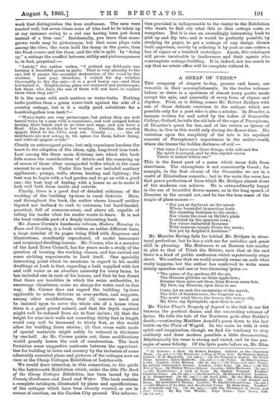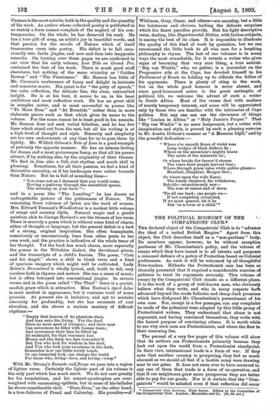THE company of singers to-day, greater and lesser, are versatile
in their accomplishments. In the twelve volumes
before us there is a specimen of almost every poetic mode except the epic, and assuredly of every form of rhyme and
rhythm. First, as is fitting, comes Mr. Robert Bridges with one of those delicate exercises in the antique which are
possible only for a poet who is also a scholar. In Demeter, a masque written for and acted by the ladies of Somerville College, Oxford, he tells the old tale of the rape of Persephone,
of Demeter's quest for her, and of her return as Queen of Hades, to live in this world only during the flower-time. His variation upon the simplicity of the tale is his mystical account of Persephone's experiences in the nether-world, where she learns the hidden darkness of evil :—
"But since I have seen these things, with salt and fire My spirit is purged, and by this crystal crown Terror is tamed within me."
This is the finest part of a poem which never falls from stateliness. The atmosphere is not consistently Greek ; for example, in the first chorus of the Oceanides we are in a world of Elizabethan conceits ; but in the main the verse has that grave perfection of form which Mr. Bridges almost alone of the moderns can achieve. He is extraordinarily happy in the use of beautiful flower-names, as in the long speech of
Demeter in the second act, and he has the true sense of the magic of place-names :—
"Nor yet at daybreak on the meads Where bountiful Symaethus leads His chanting boatmen to the main ; Nor where the road on Hybla's plain Is skirted by the spacious corn; Nor where embattled Syracuse With lustrous temple fronts the morn; Nor yet by dolphin'd Arethuse."
Mr. Maurice Baring falls far behind Mr. Bridges in struc- tural perfection, but he has a rich ear for melodies and great
skill in phrasing. His Mahasena is an Eastern tale similar
in plot to that of ITriah the Hittite, save that at the end there is a kind of public confession which mysteriously stops short. We confess that we could scarcely swear on oath what really happens, but the author has contrived to write some stately speeches and one or two charming lyrics
The spices of thy gardens fill the air, The blossom glistens on thine apple-tree ; Sweeter than spice art thou, than flowers more fair, My Dew, my Blossom, open thou to me.
Come, let us seek the mountains of the myrrh, The hills of frankincense, the fragrant sea, The north wind blows, the leaves, tho waters stir, My Dove, my Springtide, open thou to me."
Mr. Victor Plarr's Tragedy of Asgard is the link in our list between the poetical drama and the succeeding volumes of lyrics. He tells the tale of the Northern gods after Balder's
death,—continuing Matthew Arnold's poem down to the last battle on the Plain of Wigrid. In the main he tells it with spirit and imagination, though we find his tendency to stop suddenly and draw modern parallels a little disconcerting. Rhythmically his verse is strong and varied, and he has pas- sages of some felicity. Of the lyric poets before us, Mr. Bliss
* (1) Demeter: a Mask. By Robert Bridges. Oxford : at the Clarendon Press. [1s. net.]—(2) Malumena : a Play in Three Acts. By Maurice Baring. Oxford : B. H. Blackwell. [1s. net.]—(3) The Tragedy of Asgard. By Victor Plarr. London : Elkin Mathews. [1s. net.]—(4) Poems. By Bliss Carman. 2 vols. London : John Murray. [ia 2s. net.]—(5) Peace, and other Poems. By Arthur Christopher Benson. London : John Lane. [5s. net.]—(6) The Nets of Love. By Wilfrid Wilson Gibson. London : Elkin Mathews. [1s. net.] —(7) Windlestravi : a Book of Verse. By Pamela Teututut. London : Chiswick Press. [2s. 6d. net.]—(8) Dreamland. By Eleanor Esher. London : A. L. Humphreys. [2s. 6d. net.]—(9) Apra Lilac. By the Hon. Eleanour Norton. London : Simpkin, Marshall, and Co. [6d.J—(10) Sonnets and Songs. By Archibald T. Strong. London : W. Blackwood and Sons. [511. net.] —(11) Rhymes of the East, and Recollected Verses. By Dum-Dum. London : A. Constable and Co. [Is. 6d. net.]—(12) The Parliament of Beasts, and other Verses. By Rip van Winkle. Cape Town : Cape TiritC3.
[2s. Oh net. J
so stately a form cannot complain of the neglect of his con- temporaries. On the whole, he has deserved his rank. He has a true gift of song, an artist's joy in beautiful words, and that passion for the moods of Nature which of itself transmutes verse into poetry. His defect is to fall occa- sionally into facile jingles, and now and then into inapposite conceits. On turning over these pages we are confirmed in our view that his early volume, Low Tide on Grand Pre, contained the best of his work. There is much good stuff elsewhere, but nothing of the same wizardry as "Golden Rowan" and "The Pensioners." Mr. Benson has little of Mr. Carman's exuberance of fancy and delight in intricate and sonorous music. His quest is for "the piety of speech," the calm reflection, the delicate line, the clear, untroubled insight. He is at his best, it seems to us, in his least ambitious and most reflective work. He has no great skill in complex metre, and is most successful in poems like "To Have Seen" and "At Eventide" rather than in more elaborate pieces such as that which gives its name to the volume. For the same reason he is least good in his sonnets.
Mr. Benson does not seek verbal felicities, and he has few lines which stand out from the rest, but all his writing is at a high level of thought and style. Sincerity and simplicity
are too rare endowments at any time for us to pass them by lightly. Mr. Wilfrid Gibson's Nets of Love is a good example of precisely the opposite manner. He has an intense feeling
for drama and a most picturesque fancy, so that all his poems attract, if by nothing else, by the originality of their themes.
We find in him also a full, rich rhythm and much skill in phrasing. Sometimes, for all their passion, we feel a kind of
decorative unreality, as if his landscapes were rather brocade than Nature. But be is full of sounding lines— "You come not as I dreamed that you would come, Hewing a pathway through the embattled spears, The morning on your brow "- and ' in a poem like "The Lambing" he has drawn an unforgettable picture of the pitilessness of Nature. The
remaining three volumes of lyrics are the work of women.
Mrs. Edward Tennant's Windlestraw is a modest little volume of songs and country idylls. Natural magic and a gentle quietism akin to George Herbert's are the themes of her verse. There is scarcely a poem which is without some kind of charm, either of thought or language, but the general defect is a lack of a strong, original inspiration. She often transplants, consciously or unconsciously, lines from other poets to her own work, and the practice is indicative of the whole tenor of her thought. Yet the book has much charm, more especially the poems in the Wiltshire dialect, the devotional pieces,
and the transcripts of a child's fancies. The poem, "Cain and his Angel," shows a skill in blank verse and a kind of spacious imagery which might well be cultivated. Lady Esher's Dreamland is wholly lyrical, and, truth to tell, very careless both in rhymes and metres. She has a sense of music, but is often betrayed into conventional jingles. In certain verses and in the poem called "The Thief" there is a quaint, modish grace which is attractive. Miss Norton's April Lilac
is most modest in appearance, but it contains work of some promise. At present she is imitative, and apt to mistake obscurity for profundity, but she has moments of real elevation, and she shows a curious mastery of difficult rhythms :— "Empty that heaven of its phantom stars,
And lean unto the living. For the dead Have no more need of whispers ; and their eyes Can nevermore be filled with human tears; And nevermore their face be lifted up At midnight, for that visionary kiss.
Mourn not the dead, too late remember'd.
But You who look for wisdom in the dust, And You who lock your sweetness in the dark, Remember how one little lovely touch, Or one immortal look, can change the world For those who, living—love, and loving—weep."
With Mr. Strong's Sonnets and ,Songs we pass into a region of lighter verse. Certainly the lighter part of his volume is the only part which has much merit. We do not care greatly for his translations, and his sonnet-apostrophes are over- weighted with unmeaning epithets, but in some of his ballades he shows considerable skill. "Dum-D um," on the other band,
• Compatriots' Club Lectures. First Series. Edited by the Committee of is a true follower of Praed and Calverley. His parodies—of the Compatriots Club. London ; Macmillan find Co. [Si. 6d. net.)
verse, dealing, like Departmental Ditties, with Indian subjects, is among the best of its class. It is impossible to illustrate the quality of this kind of work by quotation, but we can recommend the little book to all who care for a laughing philosophy in rhyme. The last of our volumes is in many ways the most remarkable, for it reveals a writer who gives signs of becoming that very rare thing, a true satirist.
"Rip van Winkle," who, we gather, is a journalist on the Progressive side at the Cape, has devoted himself in his Parliament of Beasts to holding up to ridicule the follies of
his opponents. There is plenty of sting in the work, but on the whole good humour is never absent, and since good-humoured satire is the great antiseptic of political life, we welcome the advent of such a writer in South Africa. Most of the verses deal with matters of merely temporary interest, and some will be appreciated only by those who are familiar with the intricacies of Cape politics. But any one can see the cleverness of things like "Lucian in Africa" or "Holy Jamie's Prayer." That "Rip van Winkle" is no mere lampoonist, but a writer with imagination and style, is proved by such a pleasing exercise in Mr. Austin Dobson's manner as "A Museum Idyll," and by the graceful dedication :—
" Where o'er smooth floors of violet seas
Long wedges of black duikers fly ; Where on the mountain's mighty knees The mists of the Antarctic lie ; Or where beside the furrow'd stream The vines their purple harvest bear ; Where through green vales white gables gleam- Meerlust, Dauphin6, Morgen Star; Or where upon the wide Karoo
The lonely shepherd, far withdrawn, Beholds—monotonously new—
The rose of sunset and of dawn.
'Tis all one land; one people we—
If not completely reconciled, If we must quarrel, let it be
But 'as a lover or a child."







































 Previous page
Previous page